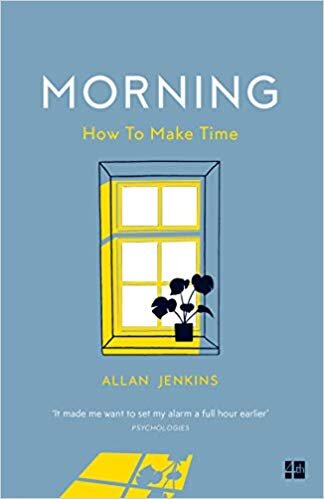Well Read Wednesday: Morning
Morning has always been my favourite time of day and so the premise of this quirky little book drew me in and I am so glad that it did. Morning, written by author and food journalist Allan Jenkins is his "manifesto for morning". 'There is an energy in the earlier hours, an awareness I enjoy. In today’s world we tend to wake as late as we can, timed to when we have to work. But we don’t need to chase the day.’In Morning, Allan Jenkins shows how getting up earlier even once a week or month can free us to be more imaginative, to maybe read, to walk, to write. He talks to other early risers such as Jamie Oliver and Samuel West, to poets and painters. We hear from a neuroscientist about sleep, a philosopher about dawn, a fisherman about light. Allan wakes early, he listens, he looks. He introduces us to a secret world.This is a celebration of dawn and morning: the best time of day.In essence the book is an intimate diary taking us through a year of the author's mornings. This is also where the writing is at it's best, especially when marvelling at the slowly waking natural world. Since many of these morning begin in pre-dawn darkness, he listens for sounds around him including naturally the increasing birdsong. the next sense to be engaged is that of sight as it records the first gentle diluting blackness and the coming of colour with the dawn's early light. Movements are noticed and even the fragrances of morning. One of the things I loved was the recording of the very subtle changes which heralded each new season.This is writing with all of the senses engaged and presented in short poetic bursts. It is a mindful journey through the quiet hours when day replaces night.For many of those interviewed, including the author, the early start provides a golden period to do those things for which they have no time in their busy lives.I love it when a book like this crosses paths with my own experience. Having thought of myself as something of an insomniac I have adjusted my bedtimes to encompass to shorter periods of sleep. The author briefly mentions this and it appears that throughout history, there have been numerous accounts of segmented sleep, from medical texts, to court records and diaries, and even in African and South American tribes, with a common reference to "first" and "second" sleep. There is strong evidence from studies carried out which suggest bi-phasic sleep is a natural process with a biological basis.Reading this great little book has inspired me to to examine my relationship with sleep more closely and maybe to question the bedtime rules which we have all accepted as the norm.
'There is an energy in the earlier hours, an awareness I enjoy. In today’s world we tend to wake as late as we can, timed to when we have to work. But we don’t need to chase the day.’In Morning, Allan Jenkins shows how getting up earlier even once a week or month can free us to be more imaginative, to maybe read, to walk, to write. He talks to other early risers such as Jamie Oliver and Samuel West, to poets and painters. We hear from a neuroscientist about sleep, a philosopher about dawn, a fisherman about light. Allan wakes early, he listens, he looks. He introduces us to a secret world.This is a celebration of dawn and morning: the best time of day.In essence the book is an intimate diary taking us through a year of the author's mornings. This is also where the writing is at it's best, especially when marvelling at the slowly waking natural world. Since many of these morning begin in pre-dawn darkness, he listens for sounds around him including naturally the increasing birdsong. the next sense to be engaged is that of sight as it records the first gentle diluting blackness and the coming of colour with the dawn's early light. Movements are noticed and even the fragrances of morning. One of the things I loved was the recording of the very subtle changes which heralded each new season.This is writing with all of the senses engaged and presented in short poetic bursts. It is a mindful journey through the quiet hours when day replaces night.For many of those interviewed, including the author, the early start provides a golden period to do those things for which they have no time in their busy lives.I love it when a book like this crosses paths with my own experience. Having thought of myself as something of an insomniac I have adjusted my bedtimes to encompass to shorter periods of sleep. The author briefly mentions this and it appears that throughout history, there have been numerous accounts of segmented sleep, from medical texts, to court records and diaries, and even in African and South American tribes, with a common reference to "first" and "second" sleep. There is strong evidence from studies carried out which suggest bi-phasic sleep is a natural process with a biological basis.Reading this great little book has inspired me to to examine my relationship with sleep more closely and maybe to question the bedtime rules which we have all accepted as the norm.